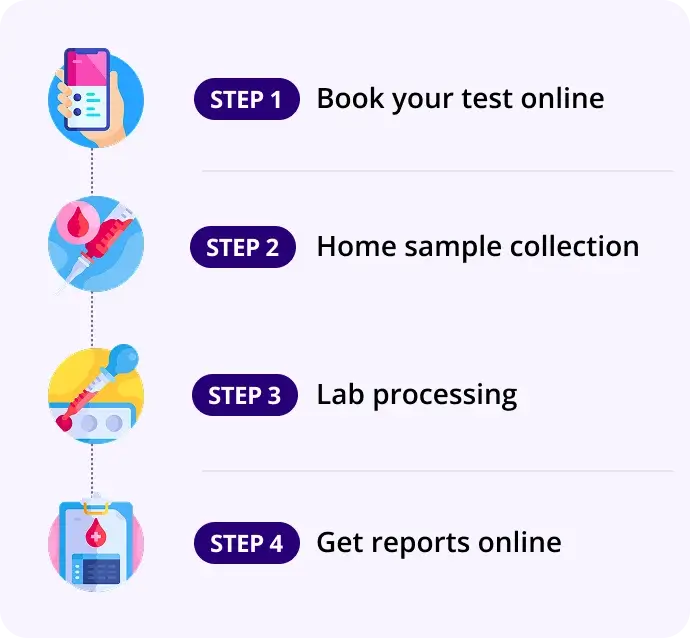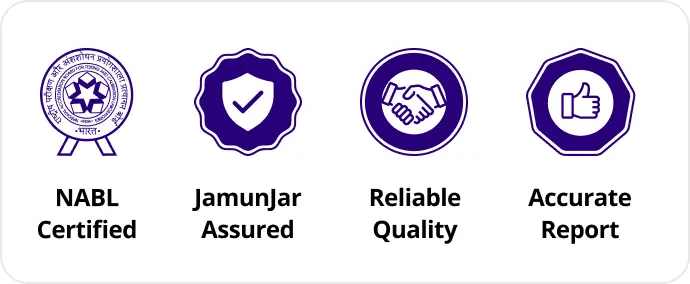Search for
Fungal Culture
Bacterial/ Viral
Report in 360Hrs
At Home
No Fasting Required
Details
Fungal culture is a microbiological test used to detect and identify fungi (yeasts and molds) in clinical samples.
₹379₹605
37% OFF
FREE:
Ai Insights
Fungal Culture - Comprehensive Medical Test Information Guide
- Why is it done?
- Test measures and detects: Fungal culture is a laboratory technique used to identify and isolate fungal organisms from various patient specimens including blood, cerebrospinal fluid, sputum, urine, skin, hair, nails, and tissue samples. It involves growing fungal microorganisms in specialized culture media to determine the specific type of fungal infection present.
- Primary indications for ordering: Suspected fungal infections including candidiasis, aspergillosis, cryptococcal meningitis, histoplasmosis, coccidioidomycosis, blastomycosis, and dermatophyte infections; immunocompromised patients with fever of unknown origin; persistent respiratory symptoms unresponsive to antibiotics; recurrent vaginal or oral infections; skin lesions with fungal characteristics; and fungal nail or hair infections.
- Typical timing and circumstances: Performed when fungal infection is clinically suspected based on patient presentation, failure of bacterial antibiotic therapy, or in immunocompromised patients including those with HIV/AIDS, undergoing chemotherapy, receiving long-term corticosteroids, or post-transplant; can be ordered urgently for critically ill patients with suspected invasive fungal infections.
- Normal Range
- Normal/Reference values: Negative or No growth - Normal result indicates absence of pathogenic fungal organisms in the specimen.
- Units of measurement: Qualitative result (positive/negative) or semi-quantitative (reported as 1+, 2+, 3+, 4+ growth intensity); specific organism identification by genus and species; susceptibility results reported as sensitive/resistant to antifungal agents.
- How to interpret results: Negative = No fungal growth detected (normal); Positive = Fungal organism identified (abnormal, indicates infection); Contamination = Growth of environmental fungi suggesting specimen contamination rather than true infection.
- What normal vs abnormal means: Normal (negative) result suggests absence of fungal infection in the tested specimen, though multiple negative cultures do not completely exclude fungal disease. Abnormal (positive) result indicates fungal infection requiring treatment; organism identification allows for targeted antifungal therapy selection and patient-specific management decisions.
- Interpretation
- Positive culture results: Indicates confirmed fungal infection with specific organism identification (e.g., Candida albicans, Aspergillus fumigatus, Cryptococcus neoformans); result significance depends on specimen type - positive blood culture is highly significant, positive respiratory culture may represent colonization vs infection requiring clinical correlation.
- Negative culture results: Suggests no fungal infection in the tested specimen; however, does not completely exclude fungal disease as some infections have low fungal burden, slow growth rates, or require specialized media; multiple negative cultures increase confidence in excluding fungal infection.
- Semi-quantitative results (1+ to 4+ growth): Reflects fungal burden in specimen; heavy growth (3+ to 4+) suggests significant infection, light growth (1+) may indicate colonization or contamination; clinical correlation with patient symptoms essential for interpretation.
- Antifungal susceptibility results: Organisms tested against common antifungal agents (fluconazole, amphotericin B, voriconazole, caspofungin); results guide treatment selection and predict medication effectiveness.
- Factors affecting results: Specimen quality and timing (delayed processing reduces recovery), contamination during collection, prior antifungal therapy reducing organism recovery, sample volume adequacy, specimen type (invasive specimens like blood/CSF more significant than skin/mucous membrane specimens), patient immune status influencing fungal burden.
- Clinical significance patterns: Single positive blood culture in immunocompromised patient = highly significant fungal sepsis; negative respiratory culture in clinical pneumonia may warrant repeating or using alternate diagnostic methods (BAL, biopsy); positive skin/nail culture confirms dermatophyte or superficial fungal infection; positive CSF culture indicates CNS fungal infection requiring immediate aggressive treatment.
- Associated Organs
- Primary organ systems involved: Respiratory system (fungal pneumonia, aspergillosis), central nervous system (fungal meningitis, brain abscess), cardiovascular system (fungal endocarditis), gastrointestinal tract (esophageal candidiasis), genitourinary system (urinary tract candidiasis, renal fungal infections), integumentary system (skin and nail infections), lymphoid system (infection affecting lymph nodes).
- Medical conditions associated with abnormal results: Candidiasis (oral thrush, esophagitis, bloodstream infection), aspergillosis (invasive or allergic), cryptococcal meningitis, coccidioidomycosis, histoplasmosis, blastomycosis, dermatophytosis (tinea pedis, onychomycosis), pneumocystis pneumonia, mucormycosis, dermatophyte infections.
- Diseases this test helps diagnose: Invasive fungal infections in immunocompromised hosts, opportunistic infections in HIV/AIDS patients, fungal sepsis, CNS fungal infections, chronic fungal pneumonia, cutaneous and subcutaneous mycoses, systemic mycoses including endemic fungi, catheter-related fungal infections.
- Potential complications of abnormal results: Untreated fungal infections can progress to disseminated disease affecting multiple organs, fungal sepsis with shock and multiorgan failure, CNS involvement causing permanent neurological damage, endocarditis requiring cardiac surgery, chronic infections causing tissue destruction, secondary bacterial superinfection, treatment delays increasing morbidity and mortality especially in immunocompromised patients.
- Follow-up Tests
- Additional tests based on positive culture: Repeat culture from original site to confirm organism and assess treatment response; culture from additional specimen sites if disseminated infection suspected; fungal serology (beta-D-glucan, galactomannan antigen tests) for specific organisms; histopathology with special stains (PAS, GMS) if tissue biopsy available.
- Further investigations for invasive infections: Imaging studies (chest X-ray, CT imaging for respiratory infections, MRI for CNS involvement), ophthalmologic examination for retinal manifestations (fungal endophthalmitis), echocardiography for suspected fungal endocarditis, lumbar puncture with fungal CSF culture for CNS infections.
- Monitoring frequency for ongoing conditions: Repeat cultures after 1-2 weeks of antifungal therapy to document organism clearance; ongoing cultures if fever persists despite appropriate therapy; monitoring cultures approximately weekly until sterilization confirmed; follow-up after completing antifungal treatment in high-risk patients; more frequent monitoring for CNS infections and fungemia.
- Complementary diagnostic tests: Fungal stains (KOH preparation, Gram stain, GMS stain, PAS stain) for rapid presumptive identification; PCR testing for faster organism identification and antifungal resistance detection; beta-D-glucan antigen testing for invasive candidiasis and aspergillosis screening; galactomannan antigen for aspergillosis detection; cryptococcal antigen for CNS meningitis; histopathological examination with fungal stains.
- Related tests providing complementary information: CBC with differential for immune status assessment, CD4 count in HIV-positive patients, liver function tests monitoring antifungal toxicity, renal function tests monitoring drug clearance, procalcitonin or CRP to assess inflammatory response, blood glucose monitoring for fluconazole interaction, ECG baseline before certain antifungal agents.
- Fasting Required?
- Fasting requirement: No - Fasting is not required for fungal culture specimen collection regardless of specimen type.
- Specimen collection timing: Blood cultures ideally collected before antimicrobial therapy initiation; CSF obtained during lumbar puncture procedure; respiratory specimens collected in morning for optimal recovery; urine specimens from first morning void or catheterized samples; skin/nail/hair specimens collected before washing/treatment area.
- Special collection instructions: Blood culture bottles must be inoculated immediately after collection without delay; avoid contamination by using sterile technique; adequate specimen volume required (10-20 mL blood per bottle); respiratory specimens collected via sputum, BAL, or bronchial brush in sterile containers; transport specimens to laboratory promptly at room temperature or refrigerated depending on organism type.
- Medications to consider: Antifungal therapy should ideally be delayed until culture obtained, though clinical urgency may necessitate starting treatment before results; corticosteroids do not interfere with culture but may affect clinical presentation; antibiotics do not interfere with fungal culture but should be avoided in specimen to prevent bacterial contamination masking fungal growth.
- Other patient preparation requirements: Patients should maintain normal hygiene practices before specimen collection; avoid antimicrobial soaps or lotions on area to be sampled for skin specimens; no specific bowel preparation needed; maintain normal fluid intake unless otherwise directed; advise patient collection may take 1-4 weeks for results depending on organism growth rate and type; communicate with patient regarding potential need for repeat specimens if initial culture negative but suspicion remains high.
How our test process works!

